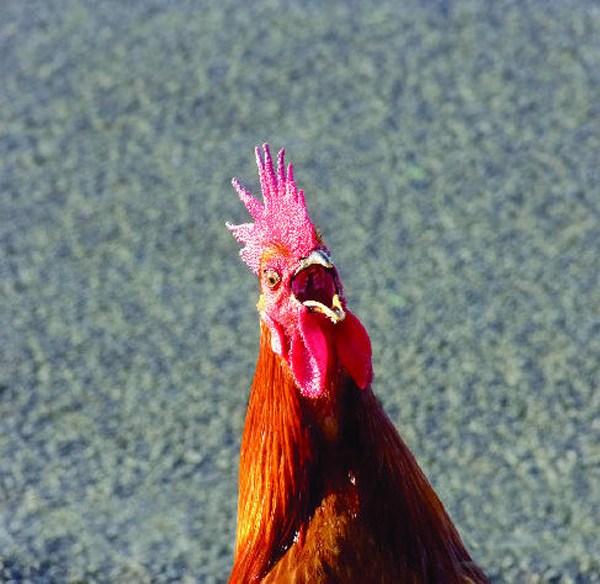LIHUE — Talk about feathers ruffled. Miffed that some tourists have expressed frustration with the seemingly endless number of roosters on Kauai, a grassroots group Monday petitioned the U.S. government to place the colorful birds on its endangered species list.
LIHUE — Talk about feathers ruffled.
Miffed that some tourists have expressed frustration with the seemingly endless number of roosters on Kauai, a grassroots group Monday petitioned the U.S. government to place the colorful birds on its endangered species list.
Part symbolic gesture, part enforcement tool, placing the noisy cocks on the federally protected list would mean anyone who bad-mouths the birds in public would be subjected to a $500 fine and up to 180 days in jail.
“Frankly, when you insult the bird you insult the whole island and that’s not aloha,” said Beaky Best, who founded the group, Rooster Respect, that submitted the request. “And not being aloha means there’s no aloha and nobody likes that.”
Think the proposal is cock a doodle do?
Think again.
The feds are considering it.
While the birds flock in huge numbers on Kauai, they’re relatively rare elsewhere. Their numbers dwindled as the country shifted from farming in the 1940s to the tech boom today.
“Personally, I like them and so does my wife when we visit Kauai on vacation,” said Hairy Flock, biologist with Department of Fish and Wildlife, the agency that will rule on the request this week. “But living with them would be another thing. We’re always happy to come home.”
One proposal being kicked around is transforming the Coco Palms property into a rooster sanctuary should birds become endangered.
The developer for the shuttered resort is considering building a $185 million rooster palace, complete with a $15 million bird-only bridge crossing Kuhio Highway to the ocean.
The birds can’t fly, after all, so crossing the road is dangerous.
“They should have the opportunity to swim in the ocean like everyone else,” said the developer, Major Ambition. “Elvis would approve.”
Being an endangered species could mean more security, too.
Mayor Benjamin Budget said he’s prepared to hire 400 employees to make up a bird protection patrol. The additional employees, who would cost $9 million a year, would also make sure people don’t chase the birds off their own property. One condition on the ESA allows the birds to roost wherever they choose, including inside homes.
“Every beak, every feather is worth the utmost aloha care,” the mayor said. “It’s only tax money, and well worth the investment.”


